How Awqaf Africa’s August Monthly Talk Inspired a New Vision for Leadership
On 17th August 2025, Awqaf Africa hosted its August Monthly Talk with the theme “Building Future Leaders: Mentorship Programs in the Waqf Ecosystem.” Leaders, scholars, and participants from across the globe gathered with one mission: to nurture the next generation of ethical, visionary, and socially responsible leaders through mentorship.
With more than 105 participants worldwide, the gathering went beyond discussion. It became a call to action for the future of Waqf and leadership in the Muslim world.
Key Highlights from the Talk
A Spiritual Beginning
The session opened with a Qur’an recitation by Omar Yusuf, which set a reflective and inspiring tone for what followed.
Welcoming and Opening Words
Afterward, Mr. Ibrahim Abdul Mugis, President of Awqaf Africa, delivered the welcoming address. He emphasized the importance of Waqf in empowering communities and strengthening leadership capacity. His words laid the foundation for the insightful discussions that followed.
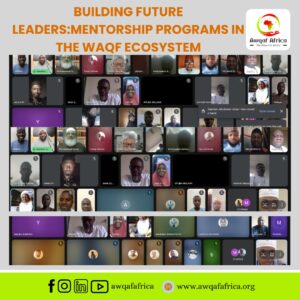
The Keynote Address
Subsequently, H.E. Muhammad Lawal Maidoki (Sadaukin Sakkwato), Deputy Secretary General of the World Zakat and Waqf Forum and Executive Chairman of the Sokoto State Zakat and Waqf Agency and advisory board of Awqaf Africa, delivered the keynote address.
He reminded participants that leadership in Islam is an amanah (trust and responsibility), not a privilege. Furthermore, he drew from the Seerah, pointing to how the Prophet Muhammad ﷺ nurtured young companions such as Usama ibn Zaid and Ibn Abbas through mentorship. Importantly, he stressed that Waqf institutions must go beyond financial aid and actively prepare ethical and visionary leaders for tomorrow.
Understanding the Waqf Ecosystem
Speakers also explained that Waqf is not simply about money. Rather, it represents an entire ecosystem made up of institutions, governance structures, trustees, donors, and beneficiaries. When managed effectively, this ecosystem not only provides financial resources but also fosters leadership development and community empowerment.
Mentorship as a Tool for Leadership Development
In addition, the discussion emphasized mentorship as a powerful tool for shaping future leaders. Unlike technical training, mentorship develops character, strengthens confidence, and nurtures resilience. It also connects youth with role models, builds networks, and ensures continuity of leadership within Waqf institutions and the wider community.
Global Examples of Mentorship in Waqf
To illustrate the impact of mentorship, speakers shared several programs already making a difference across the world:
- ZAWOUNI (Zakat and Waqf Online University): Training zakat practitioners globally.
- Higher Institute of Zakat Science (Sudan): Specialising in zakat management and governance.
- Association of Zakat and Waqf Operators in Nigeria (AZAWON): Driving collaboration and advocacy.
- Waqf Ambassador Program (Nigeria): A year-long fellowship promoting leadership, entrepreneurship, and Waqf principles.
- University Programs (IIUM, Al-Azhar, IOU, IUIU, IZU): Embedding Waqf and zakat into academic training and mentorship.
Together, these examples demonstrate that mentorship can bridge knowledge, values, and leadership on a global scale.
Why Mentorship Matters
- Moreover, the talk outlined several key benefits of mentorship in the Waqf ecosystem. It:
- Produces ethical leaders who serve with integrity.
- Reduces youth unemployment by linking skills to opportunities.
- Encourages entrepreneurship and innovation.
- Strengthens Islamic values of justice, accountability, and service.
- Creates a cycle of growth, as today’s mentees become tomorrow’s mentors.
- As a result, mentorship ensures both sustainability and long-term impact for Islamic institutions.
Challenges to Overcome
However, the discussion also acknowledged important challenges. Limited Waqf funding for human development, a shortage of experienced mentors, and weak monitoring and evaluation systems continue to restrict progress. Therefore, addressing these issues is essential if mentorship programs are to succeed and remain effective in the long term.
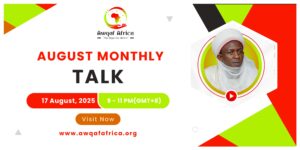
Closing Messages
The session concluded with a strong reminder that Waqf is more than financial support—it is a system for building people. Consequently, mentorship was highlighted as the bridge between providing aid and developing leaders. Participants were urged to recognise mentorship as a duty for every Waqf and zakat institution.
Datuk Dr. Mohd Ghazali, General Secretary of the world Zakat and Waqf Forum, delivered his address. He reinforced the importance of mentorship as a strategic tool for ensuring that Waqf institutions remain sustainable and impactful across generations.
In his closing remarks, Mr. Ibrahim Abdul Mugis expressed gratitude to the speakers and participants. He also called for stronger collaboration to build the next generation of leaders.
This August Monthly Talk reaffirmed Awqaf Africa’s commitment to nurturing leadership and creating opportunities for youth across the continent. By investing in mentorship, Waqf institutions can therefore secure a brighter and more sustainable future for the Ummah.

Awqaf Africa is a prominent organization dedicated to empowering communities across the African continent. Established to foster sustainable development and social welfare, Awqaf Africa focuses on harnessing the potential of endowments (awqaf) to drive positive change. Through strategic initiatives, partnerships, and impactful projects, Awqaf Africa endeavors to address socio-economic challenges and promote prosperity within African societies.
- Choose your favourite cause
- Register to our website !
- Donate the amount you like
- Stay tuned about cause


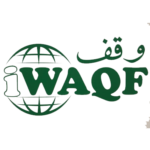
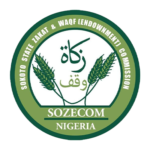
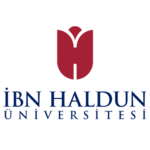
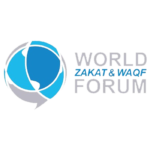
Leave a Reply